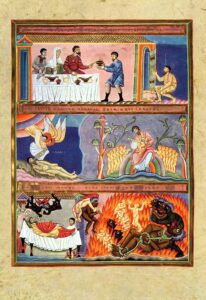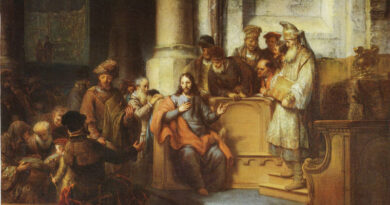XXVIth Sunday of Ordinary Time
Massimo Palombella

In today’s Gospel (Lk 16:19-31) Jesus tells the Pharisees the parable of the rich man and the poor man named Lazarus.
It would be simple, naive, and even somewhat “foolish” to identify the wealth and poverty that Jesus is talking about with something simply economic.
Jesus’ discourse is much deeper, starting with the fact that the ‘rich’ man has no name, while the ‘poor’ man is called Lazarus. The wealth stigmatised by Jesus can be identified in that attitude through which we seek our identity, our security, our value in things outside ourselves (and in this sense, even those who are economically poor can make their poverty their wealth…).
If this attitude slowly, and imperceptibly, becomes ‘habitus’, we lose our identity to the point of no longer having a name, of no longer being able to recognise ourselves and be recognised for what we really ought to be.
The wealth of empty things, external to us, in the long run humiliates us, makes us incapable of perceiving reality, consumes our identity by making us lose the most important things in our lives.
The Lord awaits us precisely in the moment we overcome the subtle temptation to be falsely ‘rich’, to seek stability and security in things that pass, to base our value on things external to us, such as the masters with whom we have studied, the prestigious centres of culture in which we have been trained, the responsibilities we have had.
The Offertory Antiphon of today’s Celebration is taken from Psalm 136 (Ps 136:1) with the following text:
“Super flumina Babylonis,
illic sedimus et flevimus dum recordaremur tui, Sion.”
(Upon the rivers of Babylon,
there we sat down and we wept, as we remembered you, O Zion).
The attached music, in Gregorian Chant, is taken from the Graduale Triplex published in Solesmes in 1979. The performance is by the Schola Hungarica conducted by Laszlo Dobszay. The music track is available on the CD “The Offertory: Gregorian Chant And Palestrina” published by “Hungaroton” in 2002.
A blessed Sunday and heartfelt greetings.


